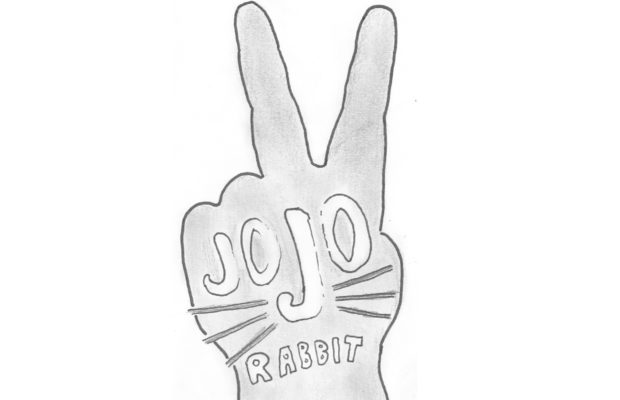Satire hops into “Jojo Rabbit”

If you have been following film over the last year, you have probably seen a particular movie make headlines. “Jojo Rabbit” is a film that has attracted controversy for its subject matter and left critics divided. Directed by Taika Waititi, the movie takes place in Nazi Germany and follows the life of Jojo, a ten-year-old Hitler Youth member. Instead of being a serious movie focused on the evils of the Nazi regime, “Jojo Rabbit” was advertised as a playful, comedic movie making light of the situation. Waititi himself even plays a goofy version of Hitler, who accompanies Jojo as his imaginary friend. Before seeing it, I admit that I was a bit concerned about whether the movie would be insensitive or offensive to those affected by the Holocaust. However, “Jojo Rabbit” is much deeper than what it was advertised to be.
The plot involves a diverse set of characters and lends itself to great character development, especially on the part of Jojo. During a Hitler Youth weekend camp, Jojo takes the advice of Hitler (his imaginary friend) and throws a grenade, severely injuring himself in the process. Jojo is deemed unfit to participate in more physical activities and stays with his mother Rosie, played by Scarlett Johansson. Jojo, who is an ardent anti-semite, soon finds out that his mother is hiding a Jewish girl named Elsa in a hidden space in their house. Initially appalled, he gradually starts to talk to her and realizes that she is not the monster that Hitler made her out to be.
The backbone of “Jojo Rabbit” is humor. Yes, there are many jokes planted throughout the movie and the audience was laughing throughout. However, “Jojo Rabbit” is purely satirical and tastefully uses humor to mock the Nazi regime and Hitler. For example, at several points throughout the movie, Jojo asks Elsa about the characteristics that make Jewish people different from Germans. Elsa responds by saying that Jewish people grow horns and can read minds, outlandish pieces from Nazi propaganda. Despite the fact that Elsa looks like a normal girl, Jojo blindly believes her. Although this is portrayed comedically, it also serves as commentary for how ridiculous but impactful Nazi propaganda was for rooting Jewish stereotypes into society. Additionally, Waititi makes Hitler seem laughable and incompetent, poking fun at the ideology that he stood for.
Much of the film’s success comes from its cast, particularly Johansson. Her portrayal of Rosie, a member of the German resistance movement, is fantastic and highlights the central anti-hate message of “Jojo Rabbit.” Through her conversations with her son, Rosie tries show that there is more to life than war and anti-Semitism. She states that love is the most powerful force in the world and shows this through her care for Jojo and Elsa simultaneously. This is a message that sticks with audiences, especially in a society that is still plagued with bigotry. Her role is highly reminiscent to the life of Miep Gies, one of the people who helped hide Anne Frank.
“Jojo Rabbit” is much more than a shallow movie that makes light of one of the darkest periods in human history. Its appropriate use of satire and message of acceptance run deep and definitely resonated with me. It is one of the freshest and most necessary movies of 2019 and is something to look out for in theaters.



